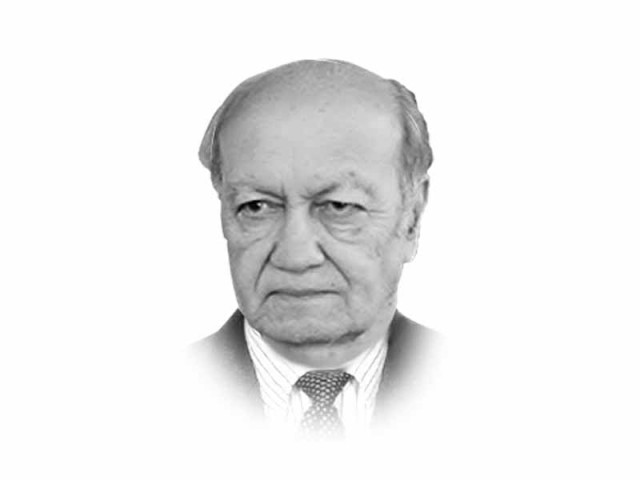Addressing critical internal contradictions
Nothing undermines the sacrifices of our brave soldiers, civilians more than politicians engaging in point scoring.

Does Imran Khan, too, realise that he is playing with fire when he gives a call to his followers to march towards Islamabad on August 14, Independence Day? This would be a deliberate attempt to destabilise the country when it is facing a potent and violent insurgency in which his province is the worst affected. Would it not be better that Imran Khan use his political clout and leadership attributes to give hope and succour to the IDPs, strengthen the morale of the armed forces and heighten the nation’s resolve by showing his solidarity with them. We are passing through a phase in our national life wherein leaders should pursue policies and politics that give security to the lives of people and strengthen the nation’s integrity and not the other way round. One fully supports Imran’s call to strengthen the electoral process but leaders should have a sense of national priorities and bring about legal and constitutional changes while remaining within the system.
Moreover, if Nawaz Sharif feels that Imran Khan’s main objective is to topple his government, then how does Imran expect him to share plans in advance of launching the military operation? It is most unfortunate that their mutual hostility prevents them from developing a relationship where the federal and provincial governments could work in close unison on matters of national security.
Nothing undermines the sacrifices of our brave soldiers and civilians more than politicians engaging in political point scoring during these testing times. Those politicians who tie themselves to the apron of the military to leverage their power should realise that they are now thoroughly exposed. Their trivial discourse on the media further exposes their shallowness. And the establishment, too, should distance itself from these politicians for its own credibility.
Whenever there is a major failure of civilian security forces, whether it is the police or the Airport Security Force, the army or the paramilitary forces are given the additional responsibility of overseeing security instead of taking measures to improve the performance of these civilian organisations. This has resulted in having several layers of security forces with overlapping responsibility. This approach overburdens the army by stretching it too thin when it is already heavily engaged in counterinsurgency operations and is deployed on the eastern border. All this leads to creeping militarisation of the state, with its unintended consequences. The most obvious fallout of this trend is that the leverage of the military increases, policies get skewed and insecurities of the civilian government keep increasing. When tensions build up in civil-military relations, support for the armed forces in fighting counterinsurgency efforts is affected. Ultimately, the nation is the loser — as Clausewitz has written, governments need to “maximise all elements of national power”.
It may be too early to fully assess the outcome of the North Waziristan operation as the jury is still out. But one thing is clear that the military has launched the operation with very detailed planning and is executing it with precision. The success of the North Waziristan operation will be of value only in relation to how the overall fight against militancy and radicalism triumphs. Success in North Waziristan will set the tone, raise the morale of the forces and the nation, will be a huge setback for militants and embolden the politicians, who so far have been wavering in their resolve to stand up to militants. But equally crucial is that a good and effective civilian administration is set up after the counter-insurgency operation. It is expected that once the TTP and foreign militants have been routed, an effective plan would be put in place to build and maintain a strong security architecture with the help of the local population. The TTP, having killed hundreds of Maliks and having imposed their will, have deliberately destroyed Fata’s social structure that provides the bond that ties communities together. After the completion of the military operation, the government, with the assistance of the people, will have to rebuild society in North Waziristan and Fata along with providing strong security. Our experience in the past has been disappointing. In both Swat and South Waziristan, the government has practically left it to the army to manage the administration and development efforts. Clearly, there are limits to what the latter can do.
The prime minister will also have to radically change his style and methodology of governance to be able to steer the country at a time when it is facing these Herculean challenges. Even if these were ordinary times, this quality and style of governance would be considered lacking and many steps behind the requirements of contemporary society. First, he gives an impression as though he is caught in the 1999 frame of mind and decision-making is arbitrary and over-centralised. Moreover, it is important that politicians shed all past prejudices and hangovers. Not that the military has abandoned its institutional interests, but for the prime minister, there could not be a more favourable environment of military support. He not only has an army chief of his choice, but General Sharif, in his own right, is the most suitable commander that the nation could have had at this juncture. And what is reassuring is that he is taking major military decisions with the prime minister’s personal imprimatur.
Nawaz Sharif should also bear in mind that the economic goals that he is pursuing could only be met if these are complemented with political and military strength.
Published in The Express Tribune, July 2nd, 2014.
Like Opinion & Editorial on Facebook, follow @ETOpEd on Twitter to receive all updates on all our daily pieces.















COMMENTS
Comments are moderated and generally will be posted if they are on-topic and not abusive.
For more information, please see our Comments FAQ